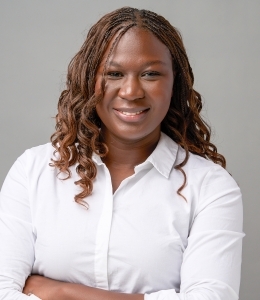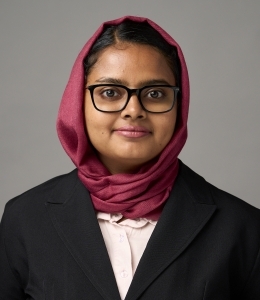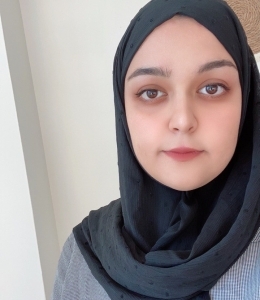
Fighting for Justice Globally: The 2023–2024 LL.M. Human Rights Fellows
As featured on the Columbia Law School website:
The fellowships from Columbia Law’s Human Rights Institute and Office of Graduate Degree Programs are awarded annually to LL.M. students with experience in human rights work and a commitment to a career in the field.
Three Columbia Law students with experience in human rights work have been awarded 2023–2024 Human Rights LL.M. Fellowships. Coordinated jointly by the Human Rights Institute (HRI) and the Office of Graduate Degree Programs, the fellowship is designed to support students pursuing LL.M. degrees who show exceptional commitment and potential to use their education to become innovators and leaders in the field of human rights either in legal practice or academia.
The current fellows have experience that includes advocating for Indigenous land rights in Uganda, freedom for detainees in Sri Lanka, and women’s rights under the repressive Taliban regime in Afghanistan. “In a world of rising authoritarianism, inequality, and climate change, this year’s LL.M. Human Rights Fellows stand as a bulwark against ongoing human rights violations,” says Sarah M. Knuckey, Lieff Cabraser Clinical Professor of Law, co-director of the Human Rights Institute, and director of the Smith Family Human Rights Clinic. “We are honored to work alongside them and support their learning as champions for human rights.”
The LL.M. Human Rights Fellows receive tailored skill training and career mentoring in both practice and academic scholarship from HRI faculty, staff, and advisers. In addition, they attend special events with leading human rights advocates and scholars, and participate in HRI research projects. Fellows also may participate in the Smith Family Human Rights Clinic.
“We are so incredibly fortunate to have these change-makers in the Columbia community,” says Julie Sculli, assistant dean of the Office of Graduate Degree Programs. “They were chosen among many outstanding candidates in a highly selective process because we recognized the impact they have already had in their communities and believe the growth and training through the Human Rights Institute will position them for even greater global change in the future.”
Read more about the fellows below:

Priscilla Aling ’24 LL.M.
Seeking Justice for Victims of War Crimes in Uganda
Home Country: Uganda
Priscilla Aling ’24 LL.M. worked for seven years at the International Criminal Court (ICC) during the case against Dominic Ongwen, a commander of the militant Lord’s Resistance Army, which devastated Aling’s home region of northern Uganda over more than two decades of violent conflict. Working with more than 2,600 victims, she investigated and documented harm, providing information that informed trial strategy in the case. In doing so, Aling helped bridge the gap between the complex Hague-based processes and the local communities that were the intended beneficiaries of the legal proceedings. Ongwen was convicted of war crimes in 2021. Inspired by her work at the ICC, Aling co-founded the Victim Support Initiative in Uganda, which advocates for victims’ rights in Uganda’s national crimes division. She has also worked with Uganda’s International Crimes Division to draft a guide to assist judges in selecting victims to participate in criminal trial processes.
The conflict in northern Uganda inspired Aling to focus her law career on victim recovery and empowerment programming. As a lawyer for Land and Equity Movement in Uganda, she worked to strengthen legal protections for communal land rights. She served as “human rights activist and community facilitator, trainer, legal representative, lobbyist, policy advocate, and sometimes simply as a friend,” she says. Aling has also participated in research projects focused on reparative justice for human rights victims for the African Centre for the Constructive Resolution of Disputes, the International Center for Transitional Justice, and Victim Advocates International. She was a 2016 Mandela Washington Fellow, a program of the Young African Leaders Initiative of the U.S. State Department.
At Columbia Law, Aling is a member of the Smith Family Human Rights Clinic. After completing her LL.M. degree, she plans to work on human rights strategic litigation at the regional level in Africa and internationally.

Amra Ismail ’24 LL.M.
Protecting Religious and Ethnic Minorities From Abuses of Law
Home Country: Sri Lanka
Amra Ismail ’24 LL.M. is a journalist turned human rights lawyer, a Fulbright scholar, and a P.E.O. International Peace Scholar. She has clerked for the Sri Lanka Supreme Court and consulted for several international, regional and local organizations including Amnesty International, where she worked on socioeconomic rights violations resulting from the economic crisis in Sri Lanka.
As a journalist and lawyer in Sri Lanka, Ismail has focused on the rights of women and detainees, particularly those who are minority Muslim and Tamil. She reported on the campaign to reform Muslim marriage laws (which inspired her to volunteer for the campaign later on) and the denial of medical care to Tamil prisoners detained under anti-terrorism laws. In 2017, she received a merit award for the best young journalist by the Sri Lanka Press Institute for her reporting on violence against women, child sexual abuse, police torture, and enforced disappearances. As a lawyer, she researched the application of anti-terrorism laws to Muslim detainees and an alternative dispute settlement mechanism for divorce under proposed amendments to Muslim marriage laws. She was also involved in litigation related to police torture, arbitrary arrests and detention, domestic violence, and challenging unconstitutional regulations.
The Human Rights Fellowship “will advance my expertise and enable me to not only lead investigations into human rights abuses in Sri Lanka but globally as well,” Ismail says. “I am interested in learning about how human rights intersects with diverse and evolving issues related to the digital space, corporate accountability, international justice, transitional justice, and gender.”
After completing her Columbia Law degree, Ismail plans to continue her advocacy with an international human rights organization, pursuing research with an interdisciplinary, intersectional, participatory approach that can be used in advocacy and litigation before local and international human rights forums.

Maryam Jami ’24 LL.M.
Supporting Women’s Rights in Afghanistan
Home Country: Afghanistan
Maryam Jami ’24 LL.M. has published research on women’s rights under the Taliban in Afghanistan and on Afghan refugees in Iran, among other subjects, and conducted research on the role of Afghan women in the peace process. The recipient of an American Association of University Women International Fellowship, Jami has been an extern for the U.N. High Commissioner for Human Rights and a legal consultant for the International Human Rights Commission and the John Humphrey Centre for Peace and Human Rights, as well as conducted research for multiple human rights organizations in Afghanistan.
Growing up during the prolonged conflict in Afghanistan, Jami chose law as a tool to combat the discrimination and abuses she saw around her. “Law, to me, meant human rights, and the way to get out of human suffering,” she says. As a law student at Herat University, she participated in a juvenile justice clinic. After the Taliban’s return to power in 2021, and despite its threats, she founded Fem for Rights, which she describes as Afghanistan’s first-ever human rights law mentorship program for women law students and lawyers.
“I wanted to be in a position, even in a small way, to resist the human rights violations and discrimination that I and many other members of vulnerable groups in my country had been experiencing,” Jami says. “I realized that I did not have to fall victim to the lack of opportunities when I had the ability to create opportunities myself.”
She was drawn to Columbia Law School by the Human Rights Institute and its faculty. “Being selected as a Human Rights Fellow means that these exceptional people believed in my ability and potential to pursue their path,” she says. ”The best part of the fellowship is, I think, the mentorship and the connections we make. These networks and circles will stay with us forever.”
At Columbia, Jami’s interests have broadened to include the role of the private sector in human rights questions—whether endangering rights or protecting them—with an eye to a possible future in the private sector.
